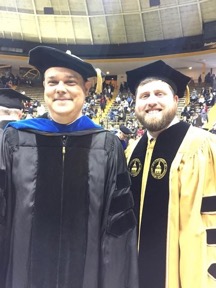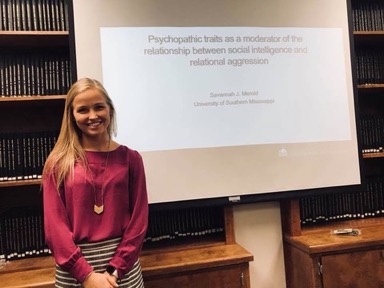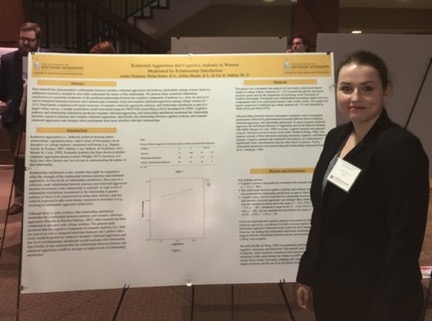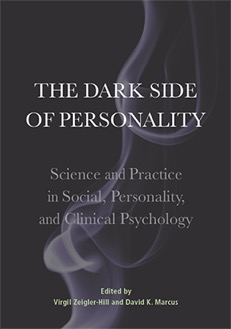
Director: Eric R. Dahlen, Ph.D.
Two New Ph.D.s
12/12/17 About

I also had the pleasure of hooding Dr. Dave Gavel, a Ph.D. student of Dr. Jon Mandracchia, a former Southern Miss faculty member who is now at Missouri Western State University.
It was great to see all three of them again. Something tells me their graduation will prove to be more memorable than it might have otherwise been due to the chaos caused by 6 inches of snow in South Mississippi!
Congratulations, graduates!
What is the Dark Triad?
11/12/17 Personality
We are simultaneously drawn to and repelled by sensationalized stories of serial killers and mass murderers, seeking to understand how one of our fellow humans could commit such atrocities against innocent victims. Are these offenders vastly different from us in their genes, early environment, and/or recent life stressors, or are we all capable of such cruelty under the right set of circumstances? We wonder about what dark aspects of the human personality might be involved in such horrific acts. The question of why people violate social norms, commit moral transgressions (e.g., deceit, manipulation), and inflict harm on others has long intrigued psychologists and the public alike.
The Dark Triad refers to three overlapping but distinct personality traits associated with a variety of antisocial and morally transgressive behaviors: psychopathy, narcissism, and Machiavelianism (Paulhus & Williams, 2002). Considered together, these traits involve emotional coldness, a lack of empathy, the desire for personal advancement at the expense of healthy relationships, grandiosity, and a willingness to manipulate others (Jonason, Lyons, Bethell, & Ross, 2013). Although there are well-known clinical manifestations of psychopathy and narcissism, work on the Dark Triad has emphasized the goal of understanding the subclinical forms of these traits found throughout the population (Furnham, Richards, & Paulhus, 2013). That is, most of the Dark Triad research seeks to understand the dark personalities we encounter in our daily lives.
Psychopathy
Psychopathy describes a specific constellation of affective, interpersonal, lifestyle, and behavioral characteristics. These include impulsivity; callous affect; poor reliability in performing various roles; a lack of remorse, empathy, or guilt; and a tendency toward rule violation (Hare, 2003; Jones & Paulhus, 2014). Although psychopathy is associated with criminality and violence (Hare & Neumann, 2009) and is considered to be the most dangerous of the Dark Triad traits, its utility is not restricted to criminal and forensic contexts. For example, subclinical psychopathy predicts a variety of behaviors that are not necessarily criminal (e.g., academic dishonesty, relational aggression, cyber aggression, substance misuse) but still likely to be of interest (Kokkinos, Antoniadou, & Markos, 2014; Williams, Paulhus, & Hare, 2007).
Narcissism
Much like the clinical version (i.e., Narcissistic Personality Disorder), subclinical narcissism involves grandiosity, as well as entitlement and a sense of superiority; however, this grandiose narcissism is only one part of the construct. Another important aspect involves narcissistic vulnerability, which refers to a vulnerable self-concept and efforts at self-enhancement (Morf & Rodenwalt, 2001). While grandiose narcissism tends to be emphasized in much of the Dark Triad literature, vulnerable narcissism appears to be relevant in many areas of emotional and interpersonal functioning. Subclinical narcissism has been linked to aggression (Bushman & Baumeister, 1998), online antisocial behavior (Carpenter, 2012), and a number of other variables of interest.
Machiavellianism
Machiavellianism is probably the least understood of the Dark Triad traits. It refers to a manipulative interpersonal style named for Niccolò Machiavelli (Christie & Geis, 1970). In The Prince (1513), Machiavelli described several behaviors most of us would regard as immoral (e.g., lying, deceit, and even murder) as effective strategies for a ruler to maintain power. Machiavellianism is perhaps best characterized as the perspective that the ends justify the means. People high in Machiavellian traits are described as cynical on morality, focused on personal gain, and willing to manipulate and exploit others to achieve their goals (Jones & Paulhus, 2009). Machiavellian personality traits have been linked to online relational aggression (Abell & Brewer, 2014) and a number of other antisocial behaviors.
At the Anger and Traffic Psychology Lab, our primary interest with regard to the Dark Triad traits involves their role in nonclinical populations (i.e., individuals in the community who are not currently receiving treatment for diagnosed personality disorders or other mental health problems) of emerging adults. That is, we are interested in how individual differences in scores on subclinical measures of Dark Triad traits relate to a variety of socially undesirable behaviors (e.g., overt and relational aggression, cyber aggression, dysfunctional anger expression, jealousy, academic dishonesty, aggressive driving) among young adults.
References
Abell, L., & Brewer, G. (2014). Machiavellianism, self-monitoring, self-promotion and relational aggression on Facebook. Computers in Human Behavior, 36, 258-262.
Bushman, B. J. & Baumeister, R. F. (1998). Threatened egotism, narcissism, self-esteem, and direct and displaced aggression: Does self-love or self-hate lead to violence? Journal of Personality and Social Psychology, 75, 219-229.
Carpenter, C. J. (2012). Narcissism on Facebook: Self-promotional and anti-social behavior. Personality and Individual Differences, 52, 482-486.
Christie R. & Geis F. L. (1970). Studies in Machiavellianism. New York: Academic Press.
Furnham, A., Richards, S. C., & Paulhus, D. L. (2013). The dark triad of personality: A 10 year review. Social and Personality Compass, 7, 199-216.
Hare, R. D. (2003). Manual for the Revised Psychopathy Checklist (2nd Edition). Toronto, ON, Canada: Multi-Health Systems.
Hare, R. D., & Neumann, C. S. (2009). Psychopathy: Assessment and forensic implications. The Canadian Journal of Psychiatry, 54, 791-802.
Jonason, P. K., Lyons, M., Bethell, E. J., & Ross, R. (2013). Different routes to limited empathy in the sexes: Examining the links between the Dark Triad and empathy. Personality and Individual Differences, 54, 572-576.
Jones, D. N., & Paulhus, D. L. (2014). Introducing the Short Dark Triad (SD3): A brief measure of dark personality traits. Assessment, 21, 28-41.
Jones, D.N., & Paulhus, D. L. (2009). Machiavellianism. In M.R. Leary & R.H. Hoyle (Eds.), Handbook of individual differences in social behavior. New York: Guilford.
Kokkinos, C. M., Antoniadou, N., & Markos, A. (2014). Cyber-bullying: An investigation of the psychological profile of university student participants. Journal of Applied Developmental Psychology, 35, 204-214.
Morf, C. C. & Rhodewalt, F. (2001). Unraveling the paradoxes of narcissism: a dynamic self-regulatory processing model. Psychological Inquiry, 12, 4, 177-196.
Paulhus, D. L., & Williams, K. (2002). The Dark Triad of personality: Narcissism, Machiavellianism, and psychopathy. Journal of Research in Personality, 36, 556-568.
Williams, K. M., Paulhus, D. L. & Hare, R. D. (2007). Capturing the four-factor structure of psychopathy in college students via self-report. Journal of Personality Assessment, 88, 205-219.
The Dark Triad refers to three overlapping but distinct personality traits associated with a variety of antisocial and morally transgressive behaviors: psychopathy, narcissism, and Machiavelianism (Paulhus & Williams, 2002). Considered together, these traits involve emotional coldness, a lack of empathy, the desire for personal advancement at the expense of healthy relationships, grandiosity, and a willingness to manipulate others (Jonason, Lyons, Bethell, & Ross, 2013). Although there are well-known clinical manifestations of psychopathy and narcissism, work on the Dark Triad has emphasized the goal of understanding the subclinical forms of these traits found throughout the population (Furnham, Richards, & Paulhus, 2013). That is, most of the Dark Triad research seeks to understand the dark personalities we encounter in our daily lives.
Psychopathy
Psychopathy describes a specific constellation of affective, interpersonal, lifestyle, and behavioral characteristics. These include impulsivity; callous affect; poor reliability in performing various roles; a lack of remorse, empathy, or guilt; and a tendency toward rule violation (Hare, 2003; Jones & Paulhus, 2014). Although psychopathy is associated with criminality and violence (Hare & Neumann, 2009) and is considered to be the most dangerous of the Dark Triad traits, its utility is not restricted to criminal and forensic contexts. For example, subclinical psychopathy predicts a variety of behaviors that are not necessarily criminal (e.g., academic dishonesty, relational aggression, cyber aggression, substance misuse) but still likely to be of interest (Kokkinos, Antoniadou, & Markos, 2014; Williams, Paulhus, & Hare, 2007).
Narcissism
Much like the clinical version (i.e., Narcissistic Personality Disorder), subclinical narcissism involves grandiosity, as well as entitlement and a sense of superiority; however, this grandiose narcissism is only one part of the construct. Another important aspect involves narcissistic vulnerability, which refers to a vulnerable self-concept and efforts at self-enhancement (Morf & Rodenwalt, 2001). While grandiose narcissism tends to be emphasized in much of the Dark Triad literature, vulnerable narcissism appears to be relevant in many areas of emotional and interpersonal functioning. Subclinical narcissism has been linked to aggression (Bushman & Baumeister, 1998), online antisocial behavior (Carpenter, 2012), and a number of other variables of interest.
Machiavellianism
Machiavellianism is probably the least understood of the Dark Triad traits. It refers to a manipulative interpersonal style named for Niccolò Machiavelli (Christie & Geis, 1970). In The Prince (1513), Machiavelli described several behaviors most of us would regard as immoral (e.g., lying, deceit, and even murder) as effective strategies for a ruler to maintain power. Machiavellianism is perhaps best characterized as the perspective that the ends justify the means. People high in Machiavellian traits are described as cynical on morality, focused on personal gain, and willing to manipulate and exploit others to achieve their goals (Jones & Paulhus, 2009). Machiavellian personality traits have been linked to online relational aggression (Abell & Brewer, 2014) and a number of other antisocial behaviors.
At the Anger and Traffic Psychology Lab, our primary interest with regard to the Dark Triad traits involves their role in nonclinical populations (i.e., individuals in the community who are not currently receiving treatment for diagnosed personality disorders or other mental health problems) of emerging adults. That is, we are interested in how individual differences in scores on subclinical measures of Dark Triad traits relate to a variety of socially undesirable behaviors (e.g., overt and relational aggression, cyber aggression, dysfunctional anger expression, jealousy, academic dishonesty, aggressive driving) among young adults.
References
Abell, L., & Brewer, G. (2014). Machiavellianism, self-monitoring, self-promotion and relational aggression on Facebook. Computers in Human Behavior, 36, 258-262.
Bushman, B. J. & Baumeister, R. F. (1998). Threatened egotism, narcissism, self-esteem, and direct and displaced aggression: Does self-love or self-hate lead to violence? Journal of Personality and Social Psychology, 75, 219-229.
Carpenter, C. J. (2012). Narcissism on Facebook: Self-promotional and anti-social behavior. Personality and Individual Differences, 52, 482-486.
Christie R. & Geis F. L. (1970). Studies in Machiavellianism. New York: Academic Press.
Furnham, A., Richards, S. C., & Paulhus, D. L. (2013). The dark triad of personality: A 10 year review. Social and Personality Compass, 7, 199-216.
Hare, R. D. (2003). Manual for the Revised Psychopathy Checklist (2nd Edition). Toronto, ON, Canada: Multi-Health Systems.
Hare, R. D., & Neumann, C. S. (2009). Psychopathy: Assessment and forensic implications. The Canadian Journal of Psychiatry, 54, 791-802.
Jonason, P. K., Lyons, M., Bethell, E. J., & Ross, R. (2013). Different routes to limited empathy in the sexes: Examining the links between the Dark Triad and empathy. Personality and Individual Differences, 54, 572-576.
Jones, D. N., & Paulhus, D. L. (2014). Introducing the Short Dark Triad (SD3): A brief measure of dark personality traits. Assessment, 21, 28-41.
Jones, D.N., & Paulhus, D. L. (2009). Machiavellianism. In M.R. Leary & R.H. Hoyle (Eds.), Handbook of individual differences in social behavior. New York: Guilford.
Kokkinos, C. M., Antoniadou, N., & Markos, A. (2014). Cyber-bullying: An investigation of the psychological profile of university student participants. Journal of Applied Developmental Psychology, 35, 204-214.
Morf, C. C. & Rhodewalt, F. (2001). Unraveling the paradoxes of narcissism: a dynamic self-regulatory processing model. Psychological Inquiry, 12, 4, 177-196.
Paulhus, D. L., & Williams, K. (2002). The Dark Triad of personality: Narcissism, Machiavellianism, and psychopathy. Journal of Research in Personality, 36, 556-568.
Williams, K. M., Paulhus, D. L. & Hare, R. D. (2007). Capturing the four-factor structure of psychopathy in college students via self-report. Journal of Personality Assessment, 88, 205-219.
Personal Statement Advice
10/25/17 About

We are interested in learning about how your interests fit with ours and the sort of research you’d like to pursue during your graduate training. While providing a brief summary your prior research experience can be helpful, most of this information is likely to be reflected in your CV and letters of recommendation. Thus, we encourage you to use your answer to this question to demonstrate your fit with the lab.
Due to the competitive nature of the admissions process, the Counseling Psychology Doctoral Program asks applicants to identify more than one faculty member they would be interested in working with. This is what the part of the question asking about one’s flexibility with one’s 2nd choice faculty member refers to. Applicants who clearly demonstrate fit with their 2nd choice faculty member are likely to be evaluated more positively by that faculty member. In some cases, this can increase the chances of that applicant being interviewed and ultimately receiving an offer of admission.
To sum up, applicants interested in being considered by our lab are encouraged to describe how their research interests fit with ours. Those with diverse interests who would be open to working in another lab are also encouraged to address how their interests may fit with another faculty member.
Upcoming Paper on HEXACO, Dark Triad, and Relational Aggression
10/18/17 Aggression
We just learned that a manuscript based on Niki Knight’s master’s thesis was accepted for publication in Personality and Individual Differences. Congratulations to Niki!
Here’s the abstract from the upcoming paper:
Knight, N. M., Dahlen, E. R., Bullock-Yowell, E., & Madson, M. B. (in press). The HEXACO model of personality and Dark Triad in relational aggression. Personality and Individual Differences.
Here’s the abstract from the upcoming paper:
The citation is as follows:Relational aggression has been linked to many forms of psychological maladjustment. Identifying the personality traits associated with the perpetration of relational aggression offers promise in improving our ability to understand, prevent, and treat relationally aggressive behaviors. Much of the research to date has utilized the Five Factor Model; however, the HEXACO model of personality (Ashton et al., 2004) may offer some advantages in studying aggression. Moreover, the manipulative and often covert nature of relational aggression suggests that the Dark Triad personality traits are likely to be relevant. This study explored the utility of the HEXACO model and Dark Triad in predicting relational aggression in college students’ (N = 442) peer relationships. Honesty-Humility, Agreeableness, Conscientiousness, and Openness predicted proactive and reactive relational aggression, and Emotionality also predicted reactive relational aggression. Pathological narcissism and psychopathy predicted proactive and reactive relational aggression while taking respondent gender and the full HEXACO model into account, with vulnerable narcissism and psychopathy serving as positive predictors and grandiose narcissism serving as a negative predictor. Findings support the utility of both the HEXACO and Dark Triad models in understanding peer relational aggression among emerging adults.
Knight, N. M., Dahlen, E. R., Bullock-Yowell, E., & Madson, M. B. (in press). The HEXACO model of personality and Dark Triad in relational aggression. Personality and Individual Differences.
Savannah Merold Proposes Thesis
10/05/17 Aggression | Personality

There is reason to believe that social and emotional intelligence are positive predictors of relational aggression, and some have suggested that certain levels of these forms of intelligence might be necessary for relational aggression to occur (or at least to be successful). At the same time, there is no reason to think that social or emotional intelligence would be sufficient to produce relational aggression. Thus, we plan to examine the degree to which psychopathic traits might inform our understanding of this relationship.
Congratulations to Savannah on a successful thesis proposal!
Opportunities for Students to Present and Publish Their Work
09/25/17 About
One question that often comes up during doctoral admissions involves the availability of opportunities for students working in the Anger and Traffic Psychology Lab to publish and/or present during their time in the program. We encourage our doctoral students to present at professional conferences and to submit manuscripts based on their work for publication in peer-reviewed journals.
So while these opportunities are available, how many of our students actually take advantage of them? Not surprisingly, this depends on each student and his or her professional goals. Most of our doctoral students present work based on their master’s thesis and/or dissertation at professional conferences. Some go beyond this and present the results of collaborative research projects, literature reviews, or more clinically focused work as well. With more available conferences than any of us have the time or money to attend, these opportunities are plentiful. Similarly, most of our doctoral students will submit manuscripts based on their master’s thesis and dissertation for publication in peer-reviewed journals. Students seeking academic or other research-oriented careers will typically be involved in additional research projects that aim to produce publishable manuscripts.
Similar opportunities exist for master’s students; however, their condensed time frame is often a limiting factor. Because master’s students have a shorter program of study and do not have the same research requirements as doctoral students, it is less likely that they will complete independent research projects comparable to a thesis. For most master’s students, getting involved in collaborative research projects makes more sense and can still result in presentation and/or publication opportunities. For especially talented master’s students aiming to apply to doctoral programs, independent research projects can sometimes be arranged based on fit and available resources.
So while these opportunities are available, how many of our students actually take advantage of them? Not surprisingly, this depends on each student and his or her professional goals. Most of our doctoral students present work based on their master’s thesis and/or dissertation at professional conferences. Some go beyond this and present the results of collaborative research projects, literature reviews, or more clinically focused work as well. With more available conferences than any of us have the time or money to attend, these opportunities are plentiful. Similarly, most of our doctoral students will submit manuscripts based on their master’s thesis and dissertation for publication in peer-reviewed journals. Students seeking academic or other research-oriented careers will typically be involved in additional research projects that aim to produce publishable manuscripts.
Similar opportunities exist for master’s students; however, their condensed time frame is often a limiting factor. Because master’s students have a shorter program of study and do not have the same research requirements as doctoral students, it is less likely that they will complete independent research projects comparable to a thesis. For most master’s students, getting involved in collaborative research projects makes more sense and can still result in presentation and/or publication opportunities. For especially talented master’s students aiming to apply to doctoral programs, independent research projects can sometimes be arranged based on fit and available resources.
Amber Dedeaux at the Mississippi State Research Symposium
08/22/17 Aggression

Their work led to a poster presentation at Mississippi State University’s Summer Undergraduate Research Symposium (poster available here as a .pdf file). Both Amber and Philip were able to attend the symposium at Mississippi State and found it to be a positive experience. Congratulations to both on their success.
The Dark Side of Personality
08/11/17 Personality
I recently picked up a copy of The dark side of personality: Science and practice in social, personality, and clinical psychology, edited by Zeigler-Hill and Marcus (2016). As you can likely infer from the title, it focuses on dark personality traits, starting with the Dark Triad but including others (e.g., sadism, spitefulness, authoritarianism). What is less apparent from the title is just how far beyond the traditional dark personality variables the book goes, addressing topics around the periphery of dark personality (e.g., self-esteem, dependency, urgency). I was pleasantly surprised at how much more comprehensive it was than what I was expecting.
The book is easy to recommend to anyone wanting to improve their knowledge of dark personality research. Here are a few of the things I found most impressive:
The book is easy to recommend to anyone wanting to improve their knowledge of dark personality research. Here are a few of the things I found most impressive:
- Many of the most influential researchers in the dark personality literature contributed chapters to the book, providing an excellent representation of the scope and complexity of this area of study.
- Readers are presented with information on both the adaptive and maladaptive features of each dark personality trait. This provides important context and helps one reconcile what can sometimes appear to be inconsistent findings in the literature.
- Dark personality traits are addressed in the larger context of broad models of personality (e.g., the Five Factor Model). Again, this helps readers new to the dark personality literature understand how these traits fit into systems with which they will be more familiar.
- The book is organized using some of the recent work on pathological personality traits reflected in DSM-5. This is effective here because it helps the reader group variables that might not initially seem connected into broader domains.
Gaining Research Experience in Psychology as an Undergraduate
07/27/17 Mentoring

Believe it or not, working as an RA in a Psychology research lab can be valuable for a number of other reasons too. Here are just a few examples that come to mind:
- Some students do not discover their passion for research until they have the opportunity to be part of a research lab.
- Obtaining research experience allows students to develop the sort of portfolio of skills many employers are seeking (e.g., knowledge of the research process, interpersonal awareness, the ability to contribute to a team, effective problem solving, organization and time management).
- By working as an RA, a student provides a faculty member with the opportunity to get to know him or her in a meaningful way, and this often results in a more relevant letter of recommendation (i.e., the professor is able to address the student’s potential to succeed in the research-related aspects of graduate training and/or address many of the job-relevant skills noted above).
- Being part of a research lab often gives students a clearer understanding of the research process, and this can translate into improved performance in Psychology courses.
- Working as an RA in a lab that includes graduate students provides undergraduates with an accurate idea of what it is like to be a graduate student, what to expect from graduate training, and additional opportunities for mentoring.
- Students can sometimes opt to earn elective course credit by working as an RA in a lab.
Undergraduate students enrolled at the University of Southern Mississippi’s Hattiesburg campus can learn more about joining the lab.
Five Tips For Managing Anger While Driving
07/16/17 Traffic Psychology | Anger
We have all experienced feelings of anger toward others while driving. These range from mild annoyance or frustration to intense rage. For some, it is the vehicle in the left lane driving slower than the posted speed limit. For others, it is the reckless driver weaving in and out of traffic. It is in these moments that we may become tempted to do something stupid, something that could place us in danger.
Here are five tips for staying safe in anger-provoking driving situations:
Here are five tips for staying safe in anger-provoking driving situations:
- Don't take it personally. It often seems like other drivers must be deliberately messing with you, but this is rarely the case. The "rude" driver who veered into your lane probably did not see you. The person merging onto the freeway slowly enough that you had to brake wasn't waiting for you on the on-ramp just to ruin your day. Others' bad driving is rarely aimed at you.
- Avoid name-calling. Even if you manage to refrain from yelling out your window at other drivers, research suggests that calling them inflammatory names (even just to yourself) makes you more angry rather than less angry.
- Let go of the need to be right. Your safety is more important than being right. Maybe you were the first to arrive at the 4-way stop and you have the right-of-way. If the other vehicle blasts through the intersection anyway, the fact that it was your turn will not be much consolation when it hits you.
- Recognize that if someone else is determined to have an accident, you don't need to be part of it. Sometimes, the best thing you can do is to slow down and let the other driver pass you. Maybe the other driver is intoxicated or playing with his or her smartphone. These are drivers you do not want to be close to. If they have an accident, it is better that it does not involve you.
- Remember that it is not your job to punish other drivers. We have all had the urge to honk, slow down in front of someone tailgating us, cut in front of another driver, or make obscene gestures to "teach them a lesson." This sort of retaliation may feel good, but it increases the likelihood that you could end up the target of someone else's road rage.
Daniel Deason Accepts Job at Ole Miss
07/10/17 About

We are currently working on a paper based on Daniel’s master’s thesis that examines the contribution of social anxiety to the Five Factor Model (Costa & McCrae, 1992) of personality in understanding relational aggression in college students.
Congratulations to Daniel on the new job!
Taylor Nocera-Bolton Completes Master's Project
06/26/17 Aggression

What is a master’s project? When students with master’s degrees who did not complete a formal master’s thesis during their master’s program are admitted to the Counseling Psychology Doctoral Program, they complete a master’s project before beginning work on their dissertations. A master’s project involves the completion of an independent research project that is similar to a master’s thesis but does not usually involve a thesis committee. These projects provide students with an opportunity to progress through the entire research process before taking on a dissertation. In addition to familiarizing the student with all aspects of research, they provide faculty with a clear sense of the student’s strengths and weaknesses, leading to the identification of appropriate training goals.
Taylor did a fantastic job with her master’s project, and we anticipate that she will have little difficulty transitioning into her dissertation work.
Lab Welcomes Morgan Lowe
05/30/17 About
The Anger and Traffic Psychology Lab is pleased to welcome Morgan Lowe, a student who will be entering the Counseling Psychology Master’s Program at the University of Southern Mississippi this Fall. Morgan completed her B.S. in psychology at the University of Southern Mississippi, so she is already familiar with the area. Her interests in forensic psychology, relational aggression, and anger make her a great fit for the lab. Her future career plans include working with juvenile offenders, and she hopes to pursue a doctorate in Counseling Psychology.
Congratulations to Morgan on her admission to the master’s program! We are looking forward to working with you.
Congratulations to Morgan on her admission to the master’s program! We are looking forward to working with you.
Welcoming Taylor Nocera-Bolton to the Doctoral Program
05/24/17 About
This announcement is long overdue, but we are pleased to welcome our newest doctoral student for the Fall 2017 term, Taylor Nocera-Bolton. Taylor has already been working with us during her time in the Counseling Psychology master’s program and had plans to pursue her doctorate. We were happy that she decided to apply to our program. As a doctoral student, Taylor plans to continue her research on cyber aggression.
Congratulations to Taylor on the admission!
Congratulations to Taylor on the admission!
Caitlin Clark Defends Dissertation
04/25/17 Aggression
Caitlin Clark successfully defended her dissertation on Monday. She completed a complex and time-consuming instrument development project, starting with running focus groups for item generation, moving through exploratory factor analysis with one sample, and culminating in a confirmatory factor analysis and validation study with another sample.
In spite of the increased interest received by relational aggression among emerging adults, the lack of psychometrically sound measures appropriate for this age range continues to be an important barrier. Caitlin’s dissertation, Validation of the Young Adult Relational Aggression Scale (YARAS), attempted to confirm the hypothesized factor structure of a new measure as well as assess its reliability and validity in a college student sample.
Although she was able to identify a suitable factor structure, doing so required her to correlate several items and meant that the predicted structure could not technically be confirmed (i.e., the confirmatory procedures became exploratory). Nevertheless, we learned a great deal about the construct and the new measure that should inform future work aimed at refining the measure.
Congratulations to Caitlin on completing this important milestone!
Caitlin is currently completing her predoctoral internship at the Bay Pines VA Healthcare System in Florida and has accepted a postdoctoral fellowship next year at the Michael E. DeBakey VA Medical Center in Houston.
In spite of the increased interest received by relational aggression among emerging adults, the lack of psychometrically sound measures appropriate for this age range continues to be an important barrier. Caitlin’s dissertation, Validation of the Young Adult Relational Aggression Scale (YARAS), attempted to confirm the hypothesized factor structure of a new measure as well as assess its reliability and validity in a college student sample.
Although she was able to identify a suitable factor structure, doing so required her to correlate several items and meant that the predicted structure could not technically be confirmed (i.e., the confirmatory procedures became exploratory). Nevertheless, we learned a great deal about the construct and the new measure that should inform future work aimed at refining the measure.
Congratulations to Caitlin on completing this important milestone!
Caitlin is currently completing her predoctoral internship at the Bay Pines VA Healthcare System in Florida and has accepted a postdoctoral fellowship next year at the Michael E. DeBakey VA Medical Center in Houston.
Philip Stoner Proposes Thesis
04/21/17 About
Philip Stoner, a first-year student in the Counseling Psychology doctoral program at the University of Southern Mississippi, successfully proposed his master’s thesis today. Philip’s thesis will examine the relationship of vulnerable narcissism and emotion dysregulation in self-injurious behavior and self-criticism.
Both vulnerable narcissism and emotion dysregulation have been linked to suicidality in previous studies; however, relatively little is known about the relationship of these factors to self-injurious behavior and self-criticism in non-clinical settings. Philip’s study will use a college student sample and is anticipated to generate some useful information about the important topic of college student mental health.
Congratulations to Philip on the successful proposal!
Both vulnerable narcissism and emotion dysregulation have been linked to suicidality in previous studies; however, relatively little is known about the relationship of these factors to self-injurious behavior and self-criticism in non-clinical settings. Philip’s study will use a college student sample and is anticipated to generate some useful information about the important topic of college student mental health.
Congratulations to Philip on the successful proposal!
Caitlin Clark Accepts Postdoc at Houston VA
02/27/17 About
Caitlin Clark, an advanced doctoral student currently completing her predoctoral internship at the Bay Pines VA Healthcare System in Florida, just let us know that she has accepted a postdoc position at the Michael E. DeBakey VA Medical Center in Houston. Specifically, she will be completing the Trauma/Anxiety Disorders postdoctoral fellowship, which was her top choice.
Congratulations to Caitlin!
Congratulations to Caitlin!
Moderation and Mediation
02/24/17 Research Methods
We are always on the lookout for good material on statistics and wanted to share this video from Andy Field, author of Discovering Statistics Using IBM SPSS Statistics (4th ed.), on moderation and mediation. Not only does he provide a clear explanation of the difference but he demonstrates how to do basic tests of moderation and mediation using Hayes’ PROCESS macro for SPSS.
Niki Knight Matches at Central Arkansas VA
02/17/17 About
Today is the day when doctoral students in applied psychology programs learn whether they matched with the predoctoral psychology internship sites they have ranked following a competitive application and interview process. We just learned that Niki Knight, a fourth-year doctoral student working in the Anger and Traffic Psychology Lab, will be completing her predoctoral internship next year at the Central Arkansas Veterans Healthcare System in Little Rock.
Congratulations to Niki on the successful match!
Congratulations to Niki on the successful match!



